As an amateur scholar and die-hard enthusiast of everything to do with Alice in Wonderland, I have launched a podcast that takes on Alice’s everlasting influence on pop culture. As an author who draws on Lewis Carroll’s iconic masterpiece for my Looking Glass Wars universe, I’m well acquainted with the process of dipping into Wonderland for inspiration.
The journey has brought me into contact with a fantastic community of artists and creators from all walks of life—and this podcast will be the platform where we come together to answer the fascinating question: “What is it about Alice?”
It is my great pleasure to have Curtis Clark join me as my guest! Read on to explore our conversation and check out the whole series on your favorite podcasting platform to listen to the full interview.
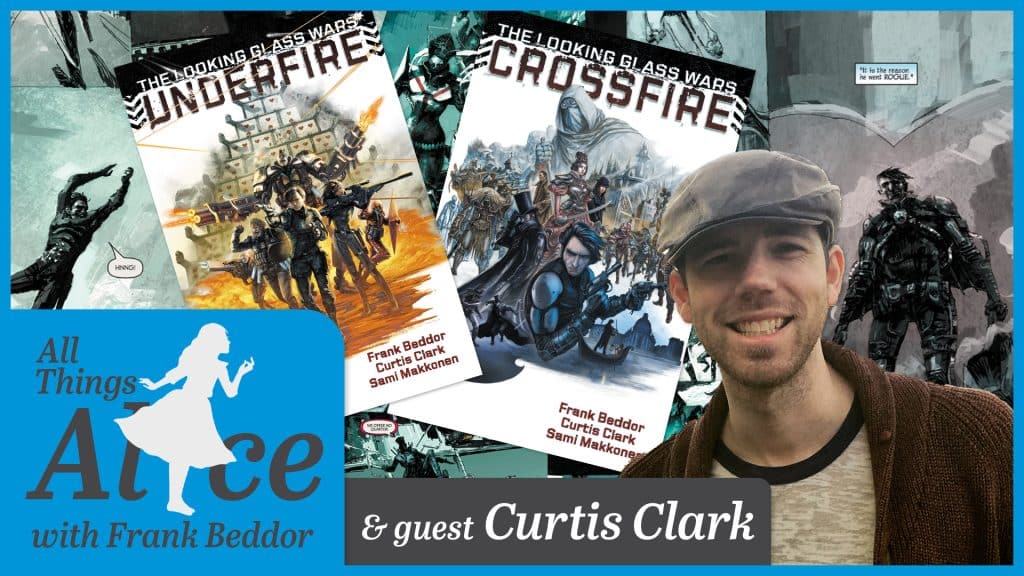
Frank Beddor
Curtis Clark. Welcome to the show. It's always a pleasure to chat with you, especially about story and creativity.
I am very interested in how a man who is as creative as you are - writing television shows, comic books, movies, games - made his way from a farm in the Midwest to Hollywood. Were you always a very creative kid? You knew you didn't want to be on the farm?
Curtis Clark
You hit the nail on the head there. I have two older brothers, six and four years older, and because of that I was constantly being introduced to films that were probably not appropriate for me at that age. I was watching Terminator when I was six. I watched a movie called Black Rain, which had a decapitation scene in it, when I was not old enough to be doing that.
At the same time, my brothers were working on the farm and I just couldn't keep up with them. I think you go one of two ways in those situations. You either get really good at that thing because you have older role models, or you get so frustrated because you can't keep up that you do the exact opposite. I just didn't have the same level of interest because everybody in my family was doing it and they were better at it than I was. Also, I’m the third son, so I think for my father, there was less pressure to make sure that I was also going to be a farmer. So eventually I went the opposite way. As much as I love and respect the farm, I knew it was not going to be my future.
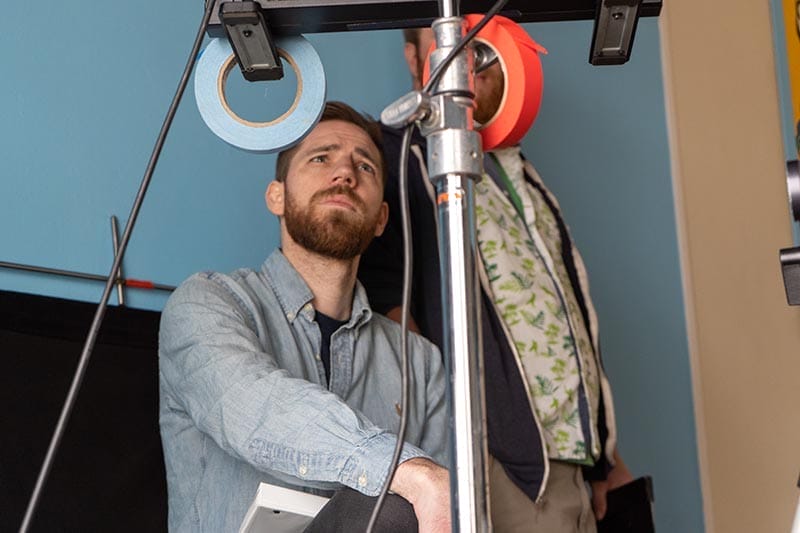
FB
Set the scene for me in terms of a dinner conversation with your parents and your brothers when you have the life on a farm. Then, this creativity, is it coming from mom or dad, both of them? Who nurtured it?
CC
Probably my older brother Peter the most, but I’ve also had the same best friends since childhood, Mark, Bryan, and Jake. They were also very nerdy like me so we were constantly bringing new things into each other's lives. I’d be at the dinner table with my parents and brothers, and they'd be talking about the farm or whatever and I was 10,000 miles away thinking about playing Dungeons and Dragons with my friends or playing Final Fantasy, or Magic the Gathering or a comic book I was in the middle of reading.
We lived a very classic 80s-90s lifestyle. It was very standard. But then, my parents got divorced when I was 11 and everything changed. Suddenly, I was bouncing between households and all of that. I brought up my childhood friends because they were constant through all of that. They’re the thing that never changed.
FB
Did you find yourself taking solace in these games? Because you've mentioned games and books but with games, you're able to really play with your friends, and talk about the game mechanics and how it works. Books are more solitary.
CC
When I was a kid, you weren’t playing over the internet, so we were all getting together and playing a video game or Magic the Gathering or Dungeons and Dragons. My games went with me as I switched between my parents’ houses. I’d take my PlayStation and play Final Fantasy VII. I’d take my Super Nintendo so I could play Mario Kart. I’d bring whatever book I was ripping through or my binder with all my Magic cards.
FB
Your childhood sounds like Stranger Things. I immediately flashed on those kids downstairs playing Dungeons and Dragons. Is that what it was like?
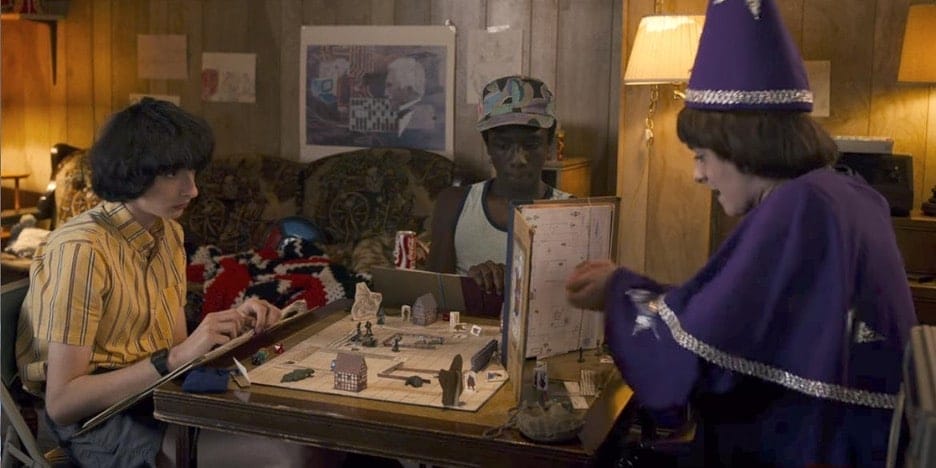
CC
100%. We had one window in our basement and we’d cover it up so it'd be pitch black and we’d play this game called the “Dark Game.” No joke, we would make it pitch black in our basement and just feel around the ground and when we found someone, we’d beat the crap out of them and run away. One time this kid named Vic Preston was in the basement and he turned all the furniture on its side. We got so weirded out because we didn't know what we were touching and he was hanging off a bar stool and he'd dropped down on somebody and started punching them.
FB
Oh, that is the coolest story ever!
What I'm really curious to hear from you is how you took your passion for all these pop culture mediums and how that propelled you to want to have a career in the entertainment industry.
CC
I don't know that I had a great plan. I was in college for public relations and I interned at a place called the Concept Farm in New York City. I was always interested in writing, but I thought writers were unicorns. They were these things that were born. I didn't realize it was a tradecraft. I didn't realize that it was just hard work. That was something that I had a great example of growing up, my brother Jake, my dad, and my mom, everybody worked hard.
So I go to Concept Farm and I'm on the top floor, and the floor below is where they did the creative production stuff. I'm down there one day and I'm talking to this guy and I find out he's the guy who writes copy for the ESPN Spelling Bee commercials. And I was like, “You've got to be effing kidding me! This guy?!” There was nothing wrong with him but I couldn't believe this guy was the unicorn. This doesn't make any sense. That was the first time I realized that you just have to choose to do this thing. Writing’s always been a confluence of all of my interests. Whether it's fantasy, science fiction, even sports, I started to realize that I've always gravitated to story and characters.
Playing with my cousins, John and Ben, we’d get all our G.I. Joes and do our little G.I. Joe missions. They’d have the good guys kill all the bad guys in five minutes. I'd be over on the other side, setting all these cars up in a line, like they're moving like a Mad Max chase. The bad guys would have killed all but one of the good guys. The good guy would have captured the robot that the bad guys had and reprogrammed him and they would have fought back together. I had just seen Road Warrior so it was like 30-minute long Mad Max fan fiction.
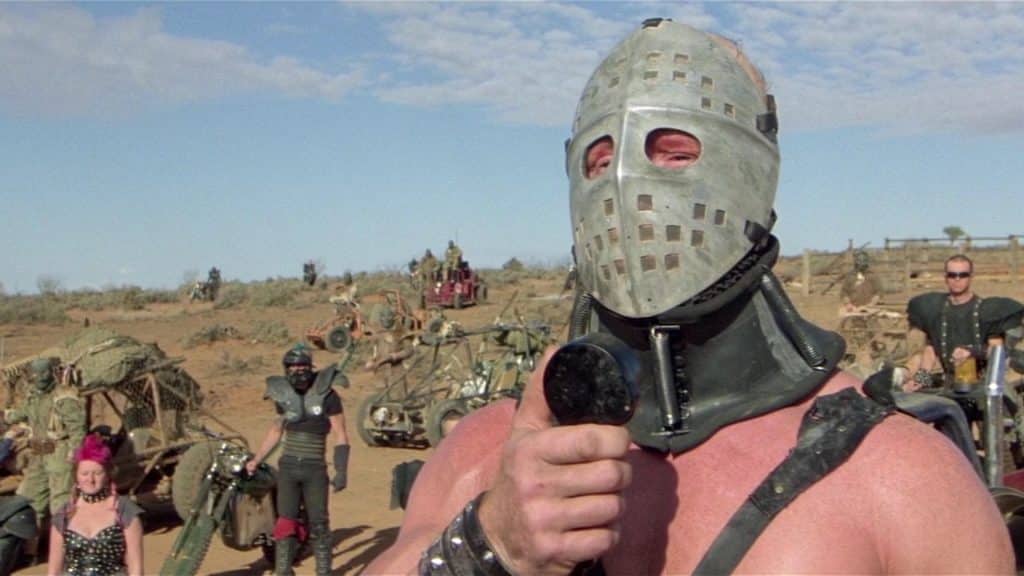
So, I met this guy at the Concept Farm and was like, “Oh my God, that's a writer. What the heck?” I graduated with my P.R. degree then turned around and got into film school at Grand Valley, which has got a decent film program. I met with this guidance counselor and he asked “Why do you want to go to film school? You already have a degree.” I said, “I want to be a writer.” He goes, “Look, you're gonna go to school with a bunch of 18-year-olds, you're gonna waste a bunch of money here. If you really want to try this, you should just move to Hollywood.” So, I come back out to the car and my girlfriend, now wife, asks how it went. I told her what the counselor said about Hollywood, which wasn’t even on the radar for me. We were gonna move to this town and live near my friend, Mark. It was gonna be a fun little thing. My wife asks, “Well, what are we gonna do?” I was like, “I don't know. What should we do?” And she just goes, “Fuck it. Let's move to Hollywood.”
FB
No wonder you married her. Not very many girlfriends would say, “Fuck it. Let's move to Hollywood on the whim of a writing career.”
CC
By the way, at that point, I had written one screenplay and it was God awful. No one should ever see this thing. All your first work should be absolutely embarrassing to you once you get good enough at something. But we drove out here and got our first apartment, our monthly rent was larger than any bill we'd ever paid before, and I started out looking for PA work, background work. Eventually I got a job at a bar and settled into a routine where I’d write six to eight hours a day five days a week and work at the bar three or four days a week at night. My wife started going back to school and we built a life that way. I met you after maybe a year and somehow I got work. It was crazy. I fell on my face over and over again and got crushed by the boulder I was pushing up the hill like Sisyphus until I figured it out.
FB
I love doing this podcast because I know you, we've done some great scripts and projects together, but I didn't know the story about what your wife said and the courage that you both showed to just hit the road, make the commitment, and see what happens.
CC
My dad thought I'd be back in two weeks. I got my first job through a Craigslist posting actually. I was a P.A. on this short film called Burying the Ex. It was my first time ever being on set, I worked 55 hours in three days for no money. I laid in an open grave, pressing up on a box like I was a person coming to life. I talked to a guy at the graveyard and distracted him so that we could do pickup shots in places we were not supposed to. The police almost put me in handcuffs because they didn't understand why we're outside this restaurant late at night. Then, at the end of it, they put me in the thing, because they wanted a guy in the scene who was as tall as the lead, who was John Francis Daley. Then they made me deliver a line. This all happened in the first weekend I was in L.A. All of these “only in Hollywood stories.”
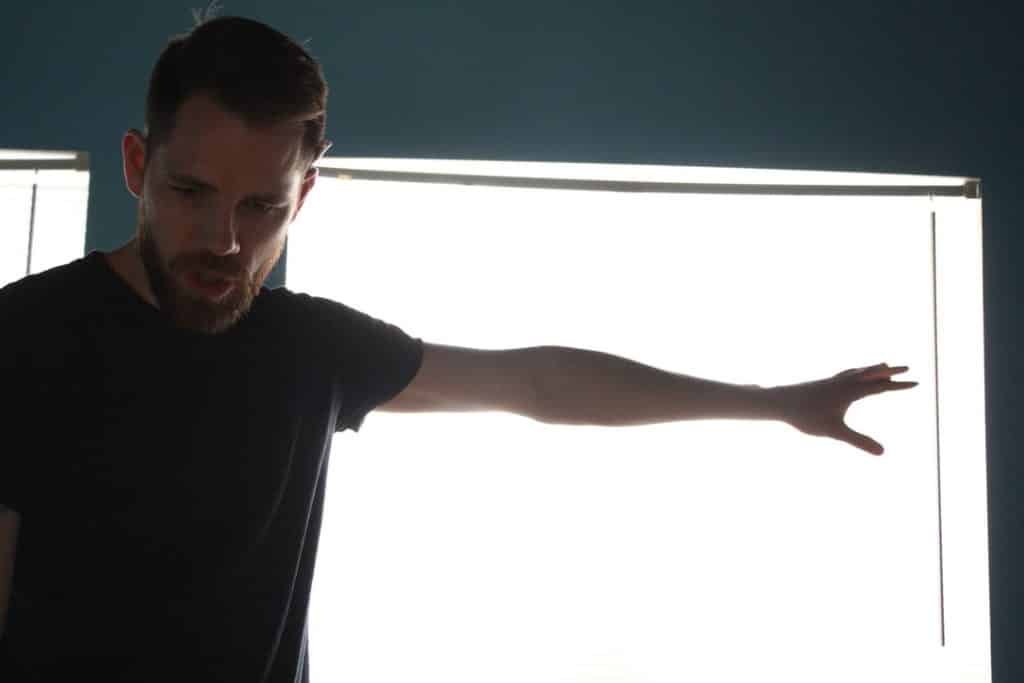
FB
What was the first line?
CC
John Francis Daly's character thinks that my girlfriend is this girl he’s supposed to be on a blind date with. He starts talking to her and I walk up like a jerk, which is hilarious, because I weighed like 135 pounds at the time. But I threaten him. I'm like, “Can I help you? No, no, no. Can I help you?”
FB
You never forget the first line.
You tell the story that you were upset with me because I didn't get right back to you after we met. I was taking my kid to a bowling birthday party and you were working at the desk. How'd you get that job, by the way, working behind the desk at a bowling alley?
CC
I met a guy playing basketball at LA Fitness, which by the way, is a great place to meet people in Hollywood. So I met this guy and his friend worked at the bar in the bowling alley, so the friend got me a job at the front desk. I’d bring my laptop so I could write while I was behind the desk, so when you walked in you saw me editing a really horrible script and that's how you and I connected.
FB
At that time, I was just getting in the mindset of, “I wonder if I can find some folks that might be interested in writing these comics that I had been considering.” I remember, almost hesitating, like, “Should I really ask him? I'm just gonna ask.” So, when I asked what you were working on, and you told me, there was just something authentic. Maybe it was the Midwest vibe that I picked up on. That started the conversation and, you tell the story much better than I do, because I didn't know what was going on in your mind until you wrote that blog for me, which was very funny.
CC
I needed mentors. I needed access. I needed all sorts of things. I didn't know my elbow from my ass. So, you came in and we talked back and forth and you gave me a business card. I was like, “Holy shit, a business card!”.
FB
That’s what's so funny to me. Just your reaction now. I remember having business cards, but no one gives out business cards anymore. It made me chuckle that the business card was the thing that ended up, as you called it, leveling up.
CC
Business cards were my existence because there’s no ladder with this industry. Nothing makes sense. There's no one way to do it. So when you get something tangible, when someone says, “Hey, man, call me, that is sometimes all you have to be like, “I'm not wasting my early 20s. I'm not moving away from my family who I love.”
There are tons of people who come out here to do a thing, say they're gonna do it, and never do it. They're here for like 10 years and they turn around and leave with nothing. It’s like the sirens in The Odyssey. It was a way for me to be like, “Hey, you're you're working. You're trying.” I could talk to you know, people back home and say, “I just met so and so and I'm trying to do this thing.” The reason I was mad at you is because I dropped off a comic book I was working on at your office, which was at the Samsung building. First, the building looked like this giant castle. I'm thinking I’m going to climb the stairs to the castle because the wizard is up there. So I go up the castle stairs and I get to your office and I put my hand on the door handle, thinking “I'm gonna charm the shit out of this guy.” It's locked. You weren’t even in the office that day. So, I had to slide the comic book underneath the door with a note like “Bowling alley guy says hi.”

FB
I remember that too. “Oh, fuck, the bowling alley guy actually followed up.”
CC
The worst part about that was I just slid it under your door and that was it. So the reason why I was getting frustrated is because early on, you're clinging to these opportunities and I had run fast and hard in the wrong direction. Because when you're starting out, especially, there's so many bullshitters. This goes back to Eagle, Michigan. I grew up in a small town. My dad was a businessman, hired locals and worked with a bunch of landowners. Everything was a handshake. If you didn't do what you said you were going to do, you were screwed because it would destroy your reputation. It could not be more different in Los Angeles. I didn't understand that someone could lie to your face and not do what they said they were going to do.
FB
That was shocking to me as well, because my father was exactly the same way. It still startles me. I still underestimate the need for the deep set of paperwork.
CC
With you not getting back to me, it was probably the exact same time that a bunch of other things weren't working out. To any young writers listening to this: That's totally normal. Don't be deterred. But what I did next is also totally normal. I kept following up. At one point, I told myself, no joke, that I'm not following up again. Because I think at that point, I just had other people not get back to me. But I followed up one more time and you emailed me back in like three minutes. It wasn't like, “Hey, man, I got it. I'll get back to you.” You said something like, “Come into my office, I might have a job for you.”
FB
I had read your comic book and really liked it. Then I thought, “I'm gonna hire this guy. This could really work out.” Then, you came into the office, and we started chatting. Did I ask you at the time if you were a fan of Alice in Wonderland or what your introduction to Alice was or if you had any interest?
CC
No matter what you would have asked me, I would have said yes. I don't remember. But, at that point, I knew who you were and what you were about as best I could from the internet and from buying one of your books.
FB
Where does Alice in Wonderland fit, if at all, in the games and books you were reading growing up? It doesn't sound like you're kind of story based on the action and Dungeons and Dragons. But I could be wrong.
CC
I was aware of it. I saw the Disney cartoon. I knew the characters. I'd seen the Tom Petty music video. I was aware of its presence in pop culture but I wasn’t the type who was gonna get a Cheshire Cat tattoo.
FB
I think we did talk about it because I could have an answer for either way. If you loved Alice, I could say you're gonna love my book. It takes a spin on it and it tries to honor the original but carve out its own space. If you didn't like the original or you weren't aware of it, my book is a whole new world with jumping off places from Alice in pop culture.
CC
Of course you have two takes, you’re a good pitch man.
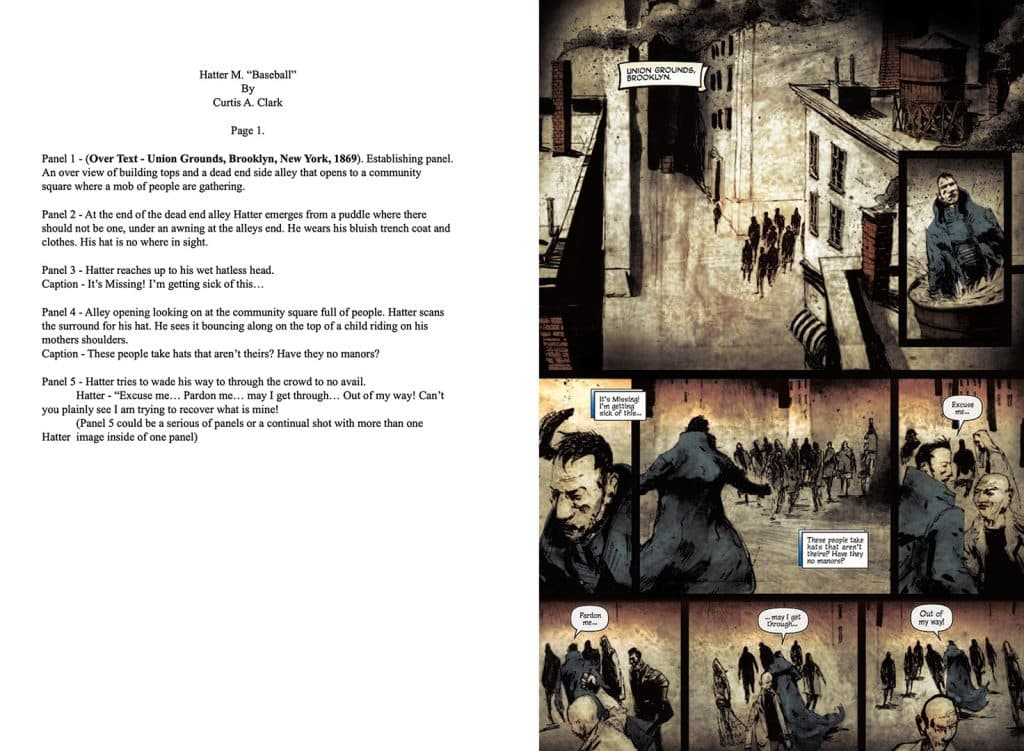

FB
The deal with the comic was you can take as much time as you need, you can pick the story, so it's going to be your creativity. Here's all I need. I need Hatter in the story. I need to feel like I'm into it. I had no idea that I was going to get a sports story. I certainly didn't think I was going to get a baseball story. What piqued my interest was how you were going to introduce Hatter into a baseball story with any logic at all. But you did a very good job of him finding his way onto this team and him demanding to know where the lost princess was and the coach or one of his teammates says, “You're gonna have plenty of time to talk to your female fans out there. Just get dressed.”
CC
Hatter’s mistaken for some schmuck who played on a team. He looked like the right fielder.
FB
The thing was you played into the fish out of water, but in a little bit of an awkward way for Hatter. He’s used to being this imposing figure and if anyone threatens him, he’s going to take you out. That's the usual set up, we're going to meet Hatter, somebody underestimates him and then he shows his skills. But in your case, you're introducing the American pastime and he’s a fish out of water the entire time. He's just trying to keep up. I absolutely loved it.
CC
It was my wife's favorite thing that I had written up until that point. She liked the end of it, where he doesn't find her but he sees how the crowd is so into baseball and thinks, “If this can exist on Earth, maybe she is safe.” It captivated the audience’s imaginations. So, I had a little button on it that was pretty cute.
FB
You seem to be pretty enamored with spies and heist movies because we did two heist movies together as well as the Crossfire graphic novel. I love that book so much. The cover, by Vincent Proce, is spectacular. Inside, Sami’s tone and color palette is really spectacular. You did a really great job on the paneling, and pulling out moments of action and suspense, which goes to this question that I'm asking you about heist movies and spy thrillers. Where did the inspiration come from?
CC
The thing about them is the genre. The wonderful thing about genre film is also the thing that some people hate about it, which is that it can be somewhat formulaic. But when you can get into the meta of it, then it becomes a lot of fun. The second of the two heist films we did is, I can't give too much away as neither of us own it, but it’s telling the audience it’s one heist film, and using all of the structure to subvert the audience because it’s actually another film. That’s what I really like about genre. We didn't get to do as much with that in these books, because we were introducing so much stuff, but we did enough of it. The thing I really liked about the films we did was it gives you a different set of tools, because the audience has such specific expectations. It’s the type of film where they want to out think you, they want to be ahead of it. But you can trick the audience and play their expectations off them and it's a lot of fun.

FB
What I liked about the second story we developed is the father-son aspect of it and grounding it in something very universal. It’s especially the tension between a son trying to live up to the expectation of a larger-than-life father figure who's very good at his job.
You did a great job. You’re really good at genre. You're also really good at world creation. Understanding your background and the games that you were inventing on your own, it's self evident, having worked with you now, why you're so good at that. That’s one of the reasons I wanted to work with you on Crossfire and Under Fire, there was a lot of story to get out and a lot of concepts that I wanted to set up. But the revelation of Crossfire was the character that you came up with, Ovid, who is a former milliner turned spy. We used to call him the James Bond of Wonderland.
CC
You had done such a great job with the books, but there were a lot of pieces of Alice in Wonderland, a lot of characters that you hadn't placed in your world yet, such as the chessmen, the house of cards, the Griffin character.At the same time, you're also expanding to the Borderlands and Morgavia and all of these places. So to me, that was fuel on the fire. But, with comic books, you have a limited amount of real estate, so it's challenging that way. I think each one of those chapters could have been its own book, to be honest.
FB
I agree with you, but I also agree that it was challenging. I also agree that we probably put more in both of those books than we needed to but I found what you did successfully was dropping in on the page. With comic books, you might get the stamp of the location and then there's the dialogue bubbles, and then you're like, “Okay, where's this going?” You really have to be mindful of the art and how the panels are helping communicate the story, and what's between the panels so that it sparks the reader's imagination and you did that really successfully.
CC
It’s a different muscle than screenwriting. Comics are not screenplays and screenplays are not novels. All of it has to do with pacing and they all have their own limitations so it can be challenging. In the case of Crossfire, the scope, especially in the last chapter, where the invasion is happening, there's like 10 different fronts and you're dealing with the pawns and there’s all these different places. With Alice, you're gonna jump from scene to scene, whereas the chapter with Ovid, it's basically P.O.V. from him. And also, for Sami, it's not always the easiest thing in the world to have these big macro pullback shots when you're trying to establish so much in one static image, whereas, in a movie, you'd be panning across, and you'd be punching in on all of these things. So it's just a different story vehicle.
FB
What was great was, you set up the stakes. We got the stakes from Alice's husband. We're using Borderlands and we're introducing the tribes, which we're actually putting into action, which was awesome. Then we understand where Alice is at and then when you drop into Ovid, the reason that chapter is so effective is because it's smaller, it's character driven. It's his relationship with somebody in our world. So you still get the balance of being in Wonderland and going back to our world. It mirrors what I did in Looking Glass Wars. Then at the end, you still pull off this epic battle that plays into when you were a kid, doing the Mad Max stuff. I'm seeing all these muscles working in this book. In Under Fire, we had a lot less real estate and, again, you did a really good job of focusing on the House of Cards, and giving us the Dirty Dozen team of card soldiers and giving them all particular specialties.
CC
That was one of my favorite things. I thought of the House of Cards as a fantasy version of G.I. Joe. It's not just a direct translation of G.I. Joe but the idea of them each having their own rank, number, and symbol, they clearly could be specialists. So it developed from there, the idea that you deal yourself the hand you need to win the game. That’s what the House of Cards is. The customization of that is like a good video game selection screen. That’s where it comes from. From my childhood, there was an actual G.I. Joe video game side scroller where you had five different Joe's, and it was like, “Okay, I'm gonna use this Joe on this level and use that Joe on that level.” It just made too much sense to me that that's what the House of Cards would be. Then when you said you wanted to do The Dirty Dozen, it was like, “Oh, yeah, let's slap a bunch of misfits into this whole thing and go from there.”

FB
Then we started to think about all the stories that we could build out from there and it became endless, like G.I, Joe, or Magic the Gathering. The graphic novel definitely has that game mechanic too.
CC
100%. I don't know where the level of success with it in terms of comics would have to be, but it's already a game in my head. It’s Magic the Gathering meets G.I. Joe. You have this paramilitary element and then you have the customization of building a deck like Magic the Gathering. That should show through with the work I did on the graphic novel. I would play that game.
FB
The thing about working with you on this, and even in this conversation, is I get really excited. Let’s keep building this thing out. There’s such a strong story engine, and the characters, and the world creation aspects that you brought to The Looking Glass Wars really expanded the possibilities. Not just in Crossfire and Under Fire, but you also assisted me with Hatter Madigan: Ghost in the Hatbox. I was starting to think about what four year school life at the millenary would be like you just put your hand up, “I'll run with that. I have a few ideas.”
CC
I wrote a 30 page curriculum, freshman to senior year with two undergraduate years. The thing that's cool about that is I did all that work, but maybe only 15-20% of it made it into the book, and a lot has changed. But that's how it works. That’s why you do the development work. It starts to take on a life of its own.
FB
You wrote a script called Run, which you've written a lot of scripts, and we've all written a lot that's still in a drawer somewhere, thank God. But Run was a really great calling card for you. Why don't you tell the listeners about that script and why it was a door opener.
CC
When I was younger, I was looking for someone to give me some guideposts when it came to writing. Starting out, I had written some stuff that wasn't great. I had written some stuff that was okay. I had gotten some jobs and I just worked my butt off, but I didn't have that great sample. I was getting by on work ethic and passion but then just failing. I needed something that was professional. I needed a business card. Something that ticked all of the boxes. So I read as many science fiction features as I could find and I said, “This is going to look exactly like those.” That's what I did on the page. That was Run. And sure enough, that ended up being the script that got me my rep. That is the script that got me working with some larger people out here.
The funny thing about it is, it's never gone to buyers. I polished it not that long ago and cut 20 pages out, because I'm better technically now. But it was a very simple idea. It was about two androids on the run with their seven year old daughter who doesn't know her parents aren't human. That's it. That's the movie. It's sci-fi, but it's a family movie, a four quadrant film. It's PG 13. It works internationally. I got close with it one time. A person who had a deal with Fox wanted Fox to buy for them but there was a competing project. It's still a good sample, but I've moved beyond it in terms of being a writer.
Stay tuned Part 2 of my interview with Curtis in which we talk more Looking Glass Wars, his passion for sci-fi, and the new graphic novel he’s working on now.
For the latest updates & news about All Things Alice, please read our blog and subscribe to our podcast!